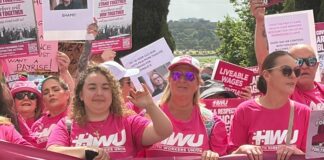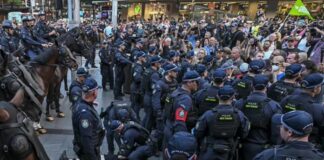Workers in UK stage first ever McStrike
McDonald’s workers have launched the first-ever strike at the multinational in Britain. BFAWU union members at two stores—Cambridge, and Crayford in south east London—mounted picket lines on 4 September. Their action is part of the Fast Food Rights campaign’s national day of action for £10 an hour minimum wage and union rights.
Stephanie was the first McDonald’s worker to walk off shift to cheers of fellow workers and supporters. “I was overwhelmed by the amount of people who were there to support us,” she told Socialist Worker. “This is the first time I’ve done anything like this. Normally when I’ve had a problem at work I’ve just got another job, but now I’m making a difference, not just for me but other workers.”
Shen, a BFAWU member at the Crayford store, said, “I’m striking to fight for a better living wage for every single person and better treatment of McDonald’s, fast food and service workers”.
The workers voted to strike by 95.6 per cent over a number of issues in the stores. Shen said, “It’s McDonald’s that has led us to this point, it’s the way McDonald’s treated us and allowed bullying and sexual harassment to carry on. If we all come together, we can change things and win.”
They are showing that it’s possible to build the union and fight in a sector that’s hard to organise.
BFAWU president Ian Hodson told Socialist Worker, “McDonald’s have been given notice. They can look at pay and the other issues or this will spread across the country—it’s two stores today, it could be 20 tomorrow, 40 next year.”
As Shen said, “This is the first of many strikes and we need the support of everyone to be able to win. I want everyone to support us because we can’t do it alone.”
By Tomáš Tengely-Evans, Socialist Worker UK
Poor bear the brunt of Hurricane Harvey
The death toll from hurricane Harvey in the US has reached at least 60, with 316,000 households without electricity, and 130,000 meals being delivered by charity the Red Cross by the end of August. The disaster shows again how the world’s wealthiest country refuses to protect its own people.
The poor have borne the brunt of the carnage in Houston, the US’s fourth largest city. Houston has a history of unplanned, corporate urban development. The city has no zoning laws so many of the poorest residents live directly adjacent to a vast petrochemical industry.
There are reports of residents being gassed and soaked in toxic chemicals released by the floods. Greed has made the city a death trap. Mayor Sylvester Turner told people to stay home because of the “crazy” logistics of evacuation. Yet Houston is known as known as the “Bayou City” because it is riddled with swamps, rivers and creeks that make it prone to flooding. There is no excuse for the lack of evacuation planning. When the hurricane hit Customs and Border Patrol officials initially said they would set up checkpoints to check people’s papers as they fled north. The message to the undocumented was drown or get deported.
Elite jobs run in the family
A new study by Andrew Leigh has shown that it’s not easy to move from poverty to riches in Australia. The study created Australia’s first long-run estimates of social mobility, based on data on rare surnames in elite professions from 1870 to present.
Amongst the 500 rare surnames are A’Beckett, Brissenden, Clubb, Westacott and Zwar. He found even today that people with the same rare last names as previous university graduates were 76 per cent more likely to gain a uni degree than people with surnames like Smith. By examining names on the Australian Medical Pioneers Index he found that today those with rare surnames are 28 per cent more likely to be doctors than the rest of the population. It has been assumed that social mobility in Australia was better than the US or UK. This study puts that in doubt.
Leaks reveal Pine Gap’s role in drone killings
Leaked US National Security Agency documents have revealed how intelligence from Australia’s Pine Gap spy base is being used on US battle fields. The documents leaked by NSA whistle-blower Edward Snowden show the base outside Alice Springs provides detailed geo-location intelligence for the US military. The information is used to locate targets for US special forces and drone strikes.
US drone strikes have led to hundreds of civilian deaths in Pakistan, Afghanistan, Syria, Yemen and Somalia. One leaked document titled “NSA Intelligence Relationship with Australia” is labelled “top secret”. It reads, “Joint Defence Facility at Pine Gap (RAINFALL) [is] a site which plays a significant role in supporting both intelligence activities and military operations.” Another says, “One of RAINFALL’s primary mission areas is the detection and geo-location of Communications Intelligence, Electronic Intelligence and Foreign Instrumentation signals.”
Emily Howie, the director of advocacy and research at the Human Rights Law Centre, says Australians at the base could be prosecuted for war crimes as a result of Pine Gap’s operations.
Arms companies exempt from anti-discrimination
Arms manufacturers have been given exemptions from anti-discrimination laws in order to refuse jobs to people born overseas or citizens of another country. Six companies in NSW have been given the exemptions, at companies including Raytheon and BAE Systems. The permission has been granted in order to meet US export restrictions on American technology.
Foreign employees can even be forced to wear coloured badges signifying their lack of higher level security clearance.
Research shows why you can’t live on Newstart
Research at UNSW by Professor Peter Saunders has shown why it’s impossible to meet basic living costs on unemployment benefits. A single person needs $100 a week more than Newstart provides to meet these basic costs, they found.
Couples without children were $107.50 behind, while single adults or couples with one child were around $50 short.
Newstart recipient Johnny Windus from Perth told the ABC, “You end up having to forfeit food, or putting your electricity bill off for another fortnight and it just goes on and on.”





